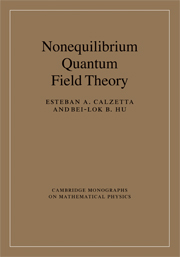Book contents
- Frontmatter
- Contents
- Preface
- I FUNDAMENTALS OF NONEQUILIBRIUM STATISTICAL MECHANICS
- II BASICS OF NONEQUILIBRIUM QUANTUM FIELD THEORY
- III GAUGE INVARIANCE, DISSIPATION, ENTROPY, NOISE AND DECOHERENCE
- IV THERMAL, KINETIC AND HYDRODYNAMIC REGIMES
- V APPLICATIONS TO SELECTED CURRENT RESEARCH
- 13 Nonequilibrium Bose–Einstein condensates
- 14 Nonequilibrium issues in RHICs and DCCs
- 15 Nonequilibrium quantum processes in the early universe
- References
- Index
15 - Nonequilibrium quantum processes in the early universe
from V - APPLICATIONS TO SELECTED CURRENT RESEARCH
- Frontmatter
- Contents
- Preface
- I FUNDAMENTALS OF NONEQUILIBRIUM STATISTICAL MECHANICS
- II BASICS OF NONEQUILIBRIUM QUANTUM FIELD THEORY
- III GAUGE INVARIANCE, DISSIPATION, ENTROPY, NOISE AND DECOHERENCE
- IV THERMAL, KINETIC AND HYDRODYNAMIC REGIMES
- V APPLICATIONS TO SELECTED CURRENT RESEARCH
- 13 Nonequilibrium Bose–Einstein condensates
- 14 Nonequilibrium issues in RHICs and DCCs
- 15 Nonequilibrium quantum processes in the early universe
- References
- Index
Summary
As stated in the Preface, we intend the chapters in the last part of the book to illustrate how quantum field theoretical methods can be applied to nonequilibrium statistical processes in several areas of current research, specifically, particle-nuclear processes (in RHIC and DCC), dynamics of cold atoms (BEC) in AMO physics and quantum processes in the early universe (cosmology) and in this endeavor also try to present an introduction to an important subject matter in that area. With this specified emphasis on the applications of techniques of NEqQFT, these accounts are more in the nature of a research topic exercise or extended example than a full review, in that the topics are selected because of the NEqQFT context, and the presentations are illustrations of the methodology. Thus we suggest the reader refer to review articles or monographs to get a more balanced and complete view on different physical approaches to the same subject matter.
In this chapter on cosmology, after a brief introduction to inflationary cosmology, highlighting the stochastic inflation model, we discuss how NEqQFT impacts on some central issues in cosmology. The methodology introduced in Chapters 4–6 covering particle creation mechanisms and the nPI CTP-CGEA/IF functional formalisms for NEq processes can be applied to solve a number of basic problems in cosmology.
Some specific processes have been discussed in earlier parts of this book.
- Type
- Chapter
- Information
- Nonequilibrium Quantum Field Theory , pp. 447 - 489Publisher: Cambridge University PressPrint publication year: 2008



